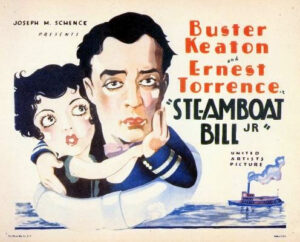This post is my contribution to the Buster Keaton Blogathon on Silent-ology. I like the idea of collaborative blogging, and I’m glad to have a chance to participate. (Updated to link to the new Blogathon post.)
(This post will hopefully attract a lot of silent film fans who aren’t among my regular readers, so I’d like to mention that I regularly present silent films on Twitch with my own real-time accompaniment. The next one will be on March 13 at 8 PM Eastern US time. The movie will be the 1925 The Lost World, preceded by Winsor McCay’s animated Gertie the Dinosaur. I hope you’ll be able to drop in!)
 The Keaton movie I know best is Steamboat Bill, Jr., having accompanied it at the Plaistow, NH library on July 28, 2023. The previous silent I’d accompanied there was Chaplin’s City Lights, and the differences between Chaplin’s and Keaton’s approaches stood out. City Lights tells a story, but it feels like a series of skits put together to comprise a story. The club scene, the robbery scene, and the boxing scene almost stand on their own. Chaplin’s Tramp is pretty much the same from beginning to end. Steamboat Bill, Jr. is more of a continuous story, and Keaton’s character grows a lot during its course. At first he feels out of place, having come from a Boston-area college to a run-down steamboat in the South. By the end, he’s become highly competent and saves four lives. The gags are as important as in a Chaplin film, but they’re more integrated into the plot.
The Keaton movie I know best is Steamboat Bill, Jr., having accompanied it at the Plaistow, NH library on July 28, 2023. The previous silent I’d accompanied there was Chaplin’s City Lights, and the differences between Chaplin’s and Keaton’s approaches stood out. City Lights tells a story, but it feels like a series of skits put together to comprise a story. The club scene, the robbery scene, and the boxing scene almost stand on their own. Chaplin’s Tramp is pretty much the same from beginning to end. Steamboat Bill, Jr. is more of a continuous story, and Keaton’s character grows a lot during its course. At first he feels out of place, having come from a Boston-area college to a run-down steamboat in the South. By the end, he’s become highly competent and saves four lives. The gags are as important as in a Chaplin film, but they’re more integrated into the plot.
(more…)
 Symphony Hall in Boston has been the site of a lot of great experiences for me. Some are faded in my memory. It’s likely that there’s one which, if you could remind me of it, would make me say, “Of course! Nothing could top that!” Right now, though, I can’t name one that was more breathtaking than last night’s presentation of Peer Gynt.
Symphony Hall in Boston has been the site of a lot of great experiences for me. Some are faded in my memory. It’s likely that there’s one which, if you could remind me of it, would make me say, “Of course! Nothing could top that!” Right now, though, I can’t name one that was more breathtaking than last night’s presentation of Peer Gynt. The Keaton movie I know best is Steamboat Bill, Jr., having accompanied it at the Plaistow, NH library on July 28, 2023. The previous silent I’d accompanied there was Chaplin’s City Lights, and the differences between Chaplin’s and Keaton’s approaches stood out. City Lights tells a story, but it feels like a series of skits put together to comprise a story. The club scene, the robbery scene, and the boxing scene almost stand on their own. Chaplin’s Tramp is pretty much the same from beginning to end. Steamboat Bill, Jr. is more of a continuous story, and Keaton’s character grows a lot during its course. At first he feels out of place, having come from a Boston-area college to a run-down steamboat in the South. By the end, he’s become highly competent and saves four lives. The gags are as important as in a Chaplin film, but they’re more integrated into the plot.
The Keaton movie I know best is Steamboat Bill, Jr., having accompanied it at the Plaistow, NH library on July 28, 2023. The previous silent I’d accompanied there was Chaplin’s City Lights, and the differences between Chaplin’s and Keaton’s approaches stood out. City Lights tells a story, but it feels like a series of skits put together to comprise a story. The club scene, the robbery scene, and the boxing scene almost stand on their own. Chaplin’s Tramp is pretty much the same from beginning to end. Steamboat Bill, Jr. is more of a continuous story, and Keaton’s character grows a lot during its course. At first he feels out of place, having come from a Boston-area college to a run-down steamboat in the South. By the end, he’s become highly competent and saves four lives. The gags are as important as in a Chaplin film, but they’re more integrated into the plot.